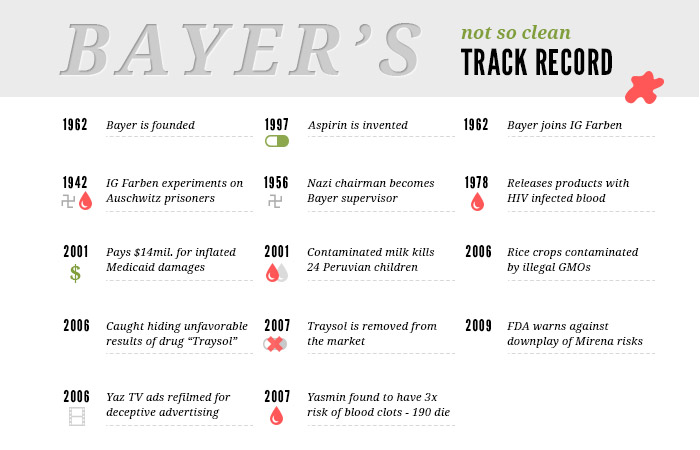
Bayer is a major pharmaceutical and chemicals company that was founded in 1863 by Friedrich Bayer and Johann Wescott in Barmen, Germany. The company is one of the largest makers of aspirin products, and enjoys a strong presence in diabetes medications, birth control and other consumer goods. Although Bayer may be most well-known for their aspirin commercials featuring stroke victims celebrating the benefits of a “aspirin regimen”, Bayer has a long and dark history in the medical industry.
Bayer’s Role in the Holocaust
To many people the Holocaust and Third Reich have become synonymous with World War II. Among the many crimes against humanity, perhaps the most renown horrors were the mass executions that took place in the extermination camps sprinkled throughout Europe. Auscwhitz is undoubtedly the most famous of them all, known for their quickness to execute prisoners and resident doctor, Josef Mengele. Wanting to better understand the human body and particularly the nuances of heredity, Mengele became infamous for his experiments that included injecting dye in to children’s eyeballs and repeated x-rays on the reproductive organs, to see if he could make prisoners infertile. By better understanding the reproductive process, Mengele wanted to propel the growth of the Aryan race while sterilizing “undesirables”- the handicapped, gypsies and those of the Jewish race.

Mengele also became well-known for performing a variety of other inhumane experiments. Some of them included injecting one twin with sickness like typhus or gangrene, and then immediately slaughtering the other when the first twin died to compare the two corpses to see the anatomical differences. To test the effectiveness of new drugs, Mengele also injected various chemicals in to his victims, often paralyzing or killing them. In other experiments Mengele would dissect pregnant mothers and children, without anesthesia. Many of these experiments were in a large part sponsored by IG Farben who paid Auschwitz doctors to test their drugs on the prison victims and to discover the “secrets to heredity”. IG Farben also manufactured the cans of Zyklon B gas that were used in Auschwitz’s gas chambers. As of 1952 the company was liquidated due to its egregious war crimes and participation in Nazi Germany. Bayer was one of the four original chemical companies that survived the company’s liquidation. In 1995 the head of Bayer, Helge Wehmeier, formally apologized to Holocaust survivor Elie Wiesel for the company’s participation in Nazi Germany. The company has yet to issue a formal apology outside of that lecture.
 Cutting Costs by Using Blood Tainted with HIV
Cutting Costs by Using Blood Tainted with HIV
After 1978 Bayer and other pharmaceutical companies produced Factor VIII and IX. The product was designed for hemophiliacs, people who suffer from a genetic disorder whose blood can not clot to stave bleeding. As a result, even a minor cut could cause them to bleed out and lose dangerous levels of blood. Factor VII is harvested from the blood plasma of non-hemophiliacs, but to purportedly cut costs Bayer harvested blood from pools of “high risk” individuals. This included: prison populations, intravenous drug users and blood from clinics with a large amount of homosexual donors. Federal law also forbids the use of blood from an individual with a history of viral hepatitis- but Bayer and other companies failed to enact strict prerequisites for blood farming. As a result, thousands of hemophiliacs died from the HIV- tainted blood plasma.
Cheating Medicaid…and taxpayers
Medicaid is a means-tested federally sponsored program to help offer pharmaceutical and medical assistance to low-income families and individuals. The program is funded by a 3% deduction from a working individuals’ paychecks, and participating doctors can bill the federal government when Medicaid qualified individuals visit their clinics. In the 1990’s the federal government launched an investigation in to Bayer’s billing practices. The Justice Department found Bayer guilty of overstating average wholesale pharmaceutical prices to receive larger reimbursements for more than 7 years. Bayer was forced to reimburse the federal government and state localities more than $14 million dollars. Fraud related to Medicare and Medicaid costs taxpayers more than $100 billion each year.
Downplaying Side Effects of their Birth Control Products
 Yaz, approved by the FDA in 2006 and its sister Yasmin (2001) were revolutionary new birth control pills that dominated the oral contraceptive market. Unlike other pills that used combinations of estrogen and progestin Yaz and Yasmin both used a synthetic hormone called drospirenone, or DSP. One of the biggest benefits women saw from Yasmin use was the mild laxative effect. Here was a pill that promised to be different, to not burden its users with excess water weight and bloating often associated with other methods of hormonal birth control. In fact due to the laxative effect, many women experienced weight loss with Yaz and Yasmin, making it a favorite among women everywhere. The birth control pills were also found to have profound effects on controlling hormone induced acne flare ups.
Yaz, approved by the FDA in 2006 and its sister Yasmin (2001) were revolutionary new birth control pills that dominated the oral contraceptive market. Unlike other pills that used combinations of estrogen and progestin Yaz and Yasmin both used a synthetic hormone called drospirenone, or DSP. One of the biggest benefits women saw from Yasmin use was the mild laxative effect. Here was a pill that promised to be different, to not burden its users with excess water weight and bloating often associated with other methods of hormonal birth control. In fact due to the laxative effect, many women experienced weight loss with Yaz and Yasmin, making it a favorite among women everywhere. The birth control pills were also found to have profound effects on controlling hormone induced acne flare ups.
But the romance was cut short when deaths started surfacing with young, healthy women who had no other anomalies or cohesive factor other than the use of Yaz or Yasmin. Michelle Pfleger was a fit, healthy 18-year-old college freshman from New Jersey when she collapsed and died from cardiac arrest due to a massive blood clot. The teen had started taking Yaz a year before to help her struggles with acne. Michelle fit none of the “high risk” categories and was well under 35, physically active and a non-smoker. According to the Coalition Against Bayer (CBG) hundreds of women have died from complications stemming from Yaz or Yasmin which has proven to be unreasonably dangerous. Phillipp Mimkes, a Board Member of CBG wants the pills and others like it pulled from the market explaining, “The Coalition Against BAYER Dangers, which has been pointing out the dangers of Yaz for years, demands a ban on all contraceptive pills with a profile of increased side effects.” Despite the controversy Bayer’s oral contraceptives still remain some of the most popular among consumers.
Bayer is also the manufacturer of the Mirena IUD, a t-shaped plastic long-term reversible birth control device that is inserted in to the vagina. Due to its ease of use the Mirena is routinely recommended to women who forget to take birth control and is a popular choice among women serving in the armed forces. The Mirena has a superior long-term failure rate of 0.7%- similar in dependability to tubal ligation. But the convenience seems to come at a high cost, women who have the Mirena have reported dangerous complications including: birth complications, ectopic pregnancy, perforation of the uterus and chronic infections. Due to over a thousand complaints surrounding the Mirena IUD the FDA released a press release on May of 2008 forcing Bayer to highlight the serious dangers of ectopic pregnancy. In addition to changing the labeling to highlight side effects Bayer’s products needed to, “Tell women who choose Mirena about the risks of ectopic pregnancy, including the loss of fertility.” Up to 1 out of every 1,000 users will experience an ectopic pregnancy with the Mirena in place, and up to half of all of these will result in an ectopic pregnancy which is a potentially life-threatening complication for the mother.
Bayer’s Control Over Contraceptives Expand, Investors Hopeful
Despite recent scrutiny in the United States Bayer enjoys a healthy share of the pharmaceutical market, and stocks for the company call for an impressive $79.00 a share. Wall Street Journal reports that Bayer has also recently acquired California-based Conceptus, Inc. best known for the Essure procedure which offers a permanent, non-surgical alternative to tubal ligation for women who no longer wish to be fertile. Slim, plastic and wire “Essure tubes” are inserted in to the fallopian tubes during a simple 45 minute procedure. If successful, the product promises sterility in 3 months. Bayer hopes the product will compliment its existing line of contraceptive products.
Trouble may still loom in the horizon however. Though estimates are rough, when asked how many lawsuits are currently pending against Bayer the answer from representatives was, “about 10,200.”






3 Comments